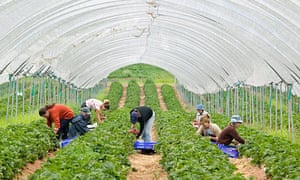Farmers’ leaders are incredulous about comments that UK can meet demand if Britain leaves EU with no deal

‘Our farmers are unable to find labour this year, never mind post Brexit,’ says one farmers’ leader. Photograph: Alamy
Farming leaders have accused Chris Grayling of “talking tripe” after he argued in a television interview that the UK could just grow more food to keep prices down if Britain crashes out of the EU.
The National Farmers’ Union, the British Summer Fruits association and the Farmers’ Union of Wales (FUW) all voiced concerns about the cabinet minister’s comments about food production made on Sunday on the BBC’s Andrew Marr Show.
Minette Batters, the deputy president of the NFU, said the hope that Britain could become more self-sufficient in food and less reliant on imports post Brexit was commendable but there was a glaring absence of any government policy on how farmers should achieve this.
“I would say he’s out of touch with farming. Of course we want to produce more, but have the rest of the cabinet got the same view? I support what he is saying, but it’s quite hard to know how this translates. I’d like to know what Philip Hammond thinks, what Michael Gove thinks of this,” she said.
“This is not about ploughing the verges to grow more food, it’s about the absence of any food policy,” added Batters. “We haven’t had a food policy for 43 years,” she said pointing out that national food and environmental policy has been led by the EU since the UK joined the European Economic Community in 1973.
Laurence Olins, who chairs British Summer Fruits, said: “When I saw that interview, my mouth dropped and I thought this needs to be addressed,” he said. “I was just horrified. It is just indicative of the un-coordinated way the government is approaching Brexit. Our farmers are unable to find labour this year, never mind post-Brexit.
“I have farmers who are moving to Portugal because they know they are able to hire people from the subcontinent. They know this. To hear Grayling come out with this tripe beggars belief,” said Olins.
Grayling had told Marr that farmers would “grow more here” and “we’ll buy more from around the world” when asked what would happen to food prices if there was no Brexit deal.
“It would mean that producers, supermarkets bought more at home, that British farmers produced more, that they bought more from around the world and it would damage French producers and continental producers,” Grayling told Marr.
Olins said the industry had a meeting with the environment secretary, Michael Gove, about hiring seasonal workers from the EU for the harvest and he told them to lobby their MP and talk to Amber Rudd.
“This is the environment secretary,” said Olins. “Mention immigration to them and they go absolutely rigid and say the only people who can speak on this issue is the home secretary, Amber Rudd, or Theresa May,” he added.
The FUW criticised Grayling’s comments, warning that sheep farmers were at risk of being wiped out unless there is a firm and urgent government promise to replace the common agricultural policy (CAP) subsidies pound for pound.
The FUW said that the transport secretary seemed to have ignored research commissioned by the government that showed the “cataclysmic” impact a hard Brexit would have on British farming.
Glyn Roberts, the FUW’s president, said: “Grayling seems unaware of the results of the economic modelling commissioned by his colleagues in Defra, which paint a far more complex picture for the UK’s many agricultural sectors, and suggest in some ‘harder’ Brexit scenarios UK food production would collapse.”
While CAP has been criticised in the past for supporting inefficient agricultural practices, Roberts has said Welsh farmers were so impoverished they could not survive without the subsidy. Their annual income would fall from an average of £13,000 to £4,000 a year.
Roberts said that the economic modelling of Defra and detailed data published by the Agricultural and Horticultural Development Board last week, “predict pretty cataclysmic collapses in many or most agricultural sectors in the event of harder Brexit ‘no-deal’ type scenarios”.
